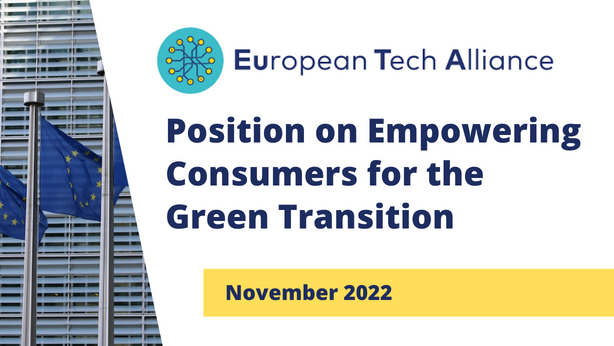EUTA Recommendations for the Ecodesign for Sustainable Products Regulation

The European Tech Alliance (EUTA) supports sustainable environmental consumption and the establishment of harmonised and European rules to this end. We endorse the objectives of the Ecodesign for Sustainable Products Regulation (ESPR), which will set performance requirements for product groups including durability, reusability, upgradeability, and reparability.
EUTA signs joint industry letter on the EU General Product Safety Regulation (GPSR)

On 22 November, the European Tech Alliance co-signed an industry letter on the General Product Safety Regulation (GPSR) urging EU policymakers to: Ensure the GPSR is consistent with the Digital Services Act (DSA); Provide enough time for implementation and alignment with the DSA; Give the supply chain flexibility in product identification; Keep the responsible person’s […]
AppJobber joins the EUTA as first crowd-sourcing platform

AppJobber joins the EUTA as first crowd-sourcing platform BRUSSELS, 10 November 2022 – Today, German crowd-sourcing platform, appJobber, joins the European Tech Alliance (EUTA) as its newest member. The EUTA now counts 36 members from 16 countries, representing the voice of European tech champions and scale-ups. The EUTA aims to contribute to smart policies promoting […]
European Tech Alliance Position on Empowering Consumers for the Green Transition

The European Tech Alliance (EUTA) fully supports the EU’s green transition ambitions. As European tech companies, we share the view that a circular and green EU economy can enhance Europe’s competitiveness in today’s challenging global environment.
Position on the revision of Regulations 1/2003 and 773/2004

The EUTA and its members welcome the European Commission’s decision of updating Regulation 1/2003, which concerns the application of EU competition law, as well as Regulation 773/2004, which details EU procedural rules in antitrust investigations. The upcoming revision will contribute to adapting the almost 20 years old framework to make sure the implementation and execution […]
How European tech companies are leveraging the power of AI

Brussels, 29 September 2022 – The European Tech Alliance hosted with MEP Dragoş Tudorache, co-rapporteur on the Artificial Intelligence Act a panel discussion on Artificial Intelligence on Thursday, 29 September 2022 from 15:30 to 18:00 in the European Parliament in Brussels. As European legislators continue to negotiate the upcoming Artificial Intelligence Act, opportunities and challenges […]
European Tech Alliance Position on EP Proposed Amendments on the AI Act

Acting as developers, deployers or users of AI systems, EUTA members rely on AI to better serve their customers and improve their operations in many ways. The EUTA welcomes the Commission’s risk-based approach to regulating AI, where transparency requirements apply to some specific AI use cases and additional obligations apply only to AI systems that […]
EUTA welcomes Mirakl, leader in marketplace SaaS, as a new member

Mirakl, global leader in marketplace software solutions, joins EUTA as a new member BRUSSELS, 13 September 2022 – Today, the European Tech Alliance (EUTA) welcomes Mirakl, a global leader in online marketplace software solutions, as a new member of the EUTA. The EUTA now counts 36 members from 16 countries, representing the voice of European […]
The EUTA welcomes its new Secretary General: Victoria de Posson

BRUSSELS, 1 September 2022 – Today, the European Tech Alliance (EUTA) welcomes Victoria de Posson as its first ever Secretary General. Victoria will lead the EUTA’s policy and advocacy work, in addition to running day-to-day operations. Since its inception 7 years ago, the EUTA has operated largely on a member-led basis. With a growing level […]
EUTA Welcomes the Digital Services Act

The European Tech Alliance (EUTA) welcomes the agreement on the Digital Services Act (DSA) announced in the early hours of Saturday 23 April. The DSA is a landmark legislation that will apply to a wide variety of online actors supported by different business models . Indeed, the DSA creates rules for all platforms hosting any […]
